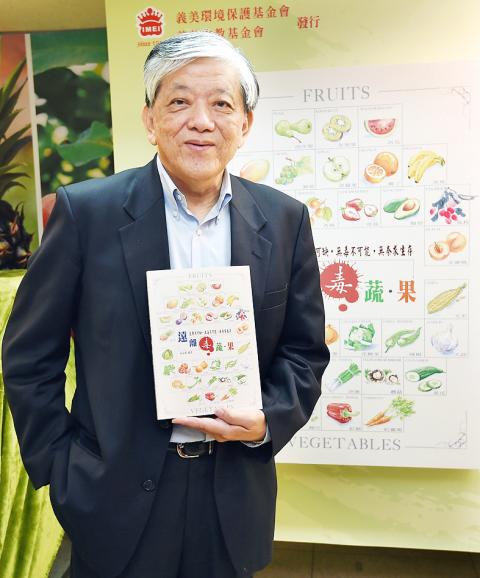The Executive Yuan on Saturday rejected an accusation by I-Mei Foods Co general manager Kao Chih-ming (高志明) that the Food and Drug Administration (FDA) had hurt the company’s sales in China by telling Chinese authorities about irregularities in I-Mei products.
Executive Yuan spokesman Sun Lih-chyun (孫立群) said Premier Mao Chi-kuo (毛治國) had received a petition from Kao earlier in the week complaining that the FDA’s action had made it harder for I-Mei exports to clear Chinese customs.
The FDA denied the accusation, saying it did not give its Chinese counterpart any information on recent food inspection at I-Mei factories, during which nine-year-old pre-packaged Lunar New Year meals were discovered.

Photo: Liao Chen-huei, Taipei Times
Those past-expiration date items were not for export and were definitely not being sold to China, a FDA spokesman said on Friday. The Straits Exchange Foundation and China’s Association for Relations Across the Taiwan Straits signed an agreement in 2008 to notify each other of information concerning food safety related to cross-strait trade.
Kao presumed that Chinese customs had received reports from the FDA on the July 2 and July 3 inspections, because I-Mei received a letter from Chinese authorities on July 5 that said I-Mei products were not allowed to clear customs because of quality problems.
Sun said that after checking with the FDA, the government was sure that it had nothing to do with I-Mei’s problems with Chinese customs.
The Cabinet also regretted that Kao blamed the government, Sun said.
The FDA said its inspectors accidentally found the outdated Lunar New Year dishes while conducting a regular check on non-alcoholic beverages at I-Mei factories.
Kao’s suggestion that the FDA might have had a political motive in releasing its inspection reports to the media immediately after the incident was unacceptable, Sun said.
I-Mei’s image suffered another blow last week when a woman in Beigang, Yunlin County, found dead worms and eggs in a pack of I-Mei chocolate-coated raisins she bought.
An I-Mei spokesman said the company reclaimed the package and sent it to food inspection authorities to determine the source of contamination.
Kao has been a vocal critic of the government’s handling of several food safety scandals that have erupted in recent years.
He said in December last year that changes to food laws in response to the scandals had increased the penalties, but failed to educate the public or small businesses about food safety, and he urged the premier to help restore Taiwan’s reputation as a food kingdom.

ANOTHER EMERGES: The CWA yesterday said this year’s fourth storm of the typhoon season had formed in the South China Sea, but was not expected to affect Taiwan Tropical Storm Gaemi has intensified slightly as it heads toward Taiwan, where it is expected to affect the country in the coming days, the Central Weather Administration (CWA) said yesterday. As of 8am yesterday, the 120km-radius storm was 800km southeast of Oluanpi (鵝鑾鼻), Taiwan’s southernmost tip, moving at 9kph northwest, the agency said. A sea warning for Gaemi could be issued tonight at the earliest, it said, adding that the storm is projected to be closest to Taiwan on Wednesday or Thursday. Gaemi’s potential effect on Taiwan remains unclear, as that would depend on its direction, radius and intensity, forecasters said. Former Weather Forecast

As COVID-19 cases in Japan have been increasing for 10 consecutive weeks, people should get vaccinated before visiting the nation, the Centers for Disease Control (CDC) said. The centers reported 773 hospitalizations and 124 deaths related to COVID-19 in Taiwan last week. CDC Epidemic Intelligence Center Director Guo Hung-wei (郭宏偉) on Tuesday said the number of weekly COVID-19 cases reported in Japan has been increasing since mid-May and surpassed 55,000 cases from July 8 to July 14. The average number of COVID-19 patients at Japan’s healthcare facilities that week was also 1.39 times that of the week before and KP.3 is the dominant

The Chinese Communist Party’s (CCP) working group for Taiwan-related policies is likely to be upgraded to a committee-level body, a report commissioned by the Mainland Affairs Council (MAC) said. As Chinese President Xi Jinping (習近平) is increasingly likely to upgrade the CCP’s Central Leading Group for Taiwan Affairs, Taiwanese authorities should prepare by researching Xi and the CCP, the report said. At the third plenary session of the 20th Central Committee of the CCP, which ended on Thursday last week, the party set a target of 2029 for the completion of some tasks, meaning that Xi is likely preparing to

US-CHINA TRADE DISPUTE: Despite Beijing’s offer of preferential treatment, the lure of China has dimmed as Taiwanese and international investors move out Japan and the US have become the favored destinations for Taiwanese graduates as China’s attraction has waned over the years, the Ministry of Labor said. According to the ministry’s latest income and employment advisory published this month, 3,215 Taiwanese university graduates from the class of 2020 went to Japan, surpassing for the first time the 2,881 graduates who went to China. A total of 2,300 graduates from the class of 2021 went to the US, compared with the 2,262 who went to China, the document showed. The trend continued for the class of 2023, of whom 1,460 went to Japan, 1,334 went to